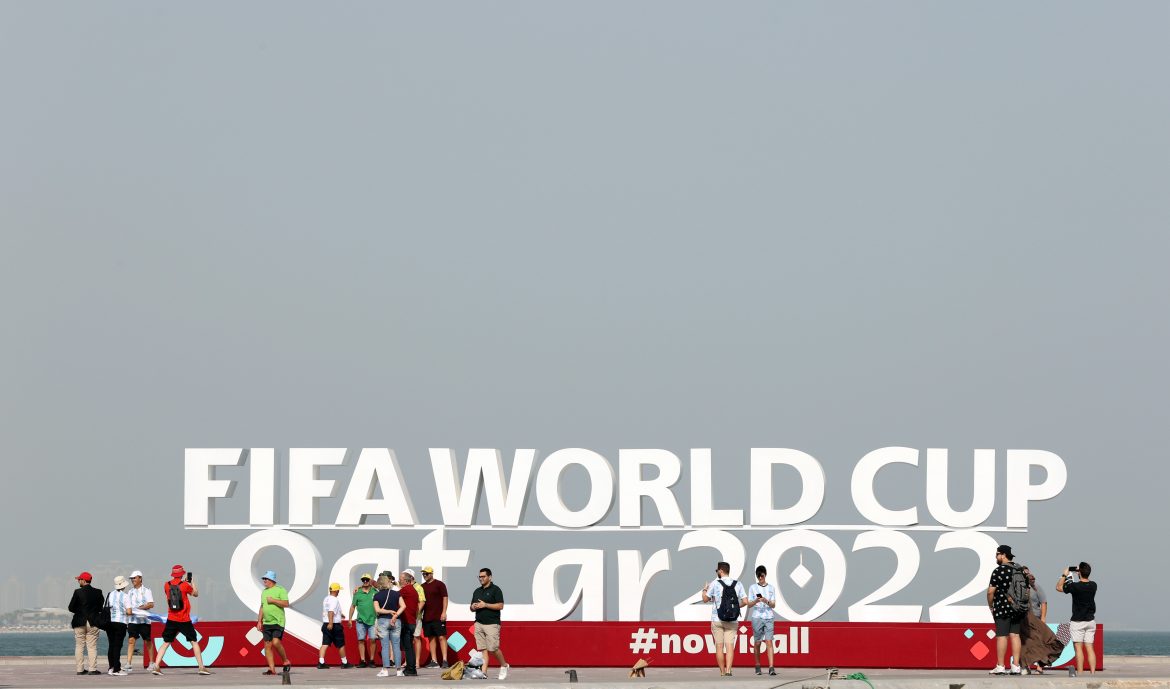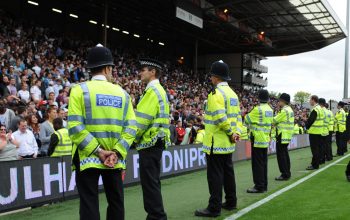This does not feel like a normal World Cup. None of the typical England flags sprawled across homes and highstreets. No one is singing ‘It’s Coming Home.’ Few seem to care.
The apathy surrounding this year’s World Cup does not stem from football over-saturation: there’s always plenty of football and always plenty of people watching it. It does not stem from the awkward kick-off times and the four-match-a-day schedule: fans often wake in the early hours and stay up into the depths of night to watch their team. It doesn’t even stem from the fact that, atypically, the tournament is being played in winter when most are still working: people will always find a way to watch football.
This apathy stems from something much more sinister: a World Cup embroiled with corruption allegations while Qatar’s record on migrant worker deaths, policies on homosexuality and human rights violations tarnishes this tournament for many.
Does anyone want this World Cup to come home?
FIFA – ‘I know that I am an honest man’:
December 2 2010. FIFA president Sepp Blatter, just moments before he announced Russia as the host of the 2018 World Cup, revealed that the small Gulf nation Qatar had won the vote to host the 2022 tournament. The 22 FIFA executive committee members who voted on who would become the host of the World Cup were in attendance and applauded as expected.
As of now, 17 of these 22 have been alleged or charged with corruption while two committee members were already suspended from this vote as they had been caught on camera asking for money in exchange for their votes.
The corruption seemingly runs deep, and the increasing smoke around Qatar’s winning of the host bid led many to suspect a great fire of corruption at FIFA.
In 2011, whistle-blower Phaedra Almajid claimed to have witnessed outright bribery between Qatar representatives and African football directors in a hotel suite in Angola. The unnamed African director allegedly said: “Ah, a million dollars? Why not a million-and-a-half?” in exchange for them to vote for Qatar to host 2022’s tournament. Almajid later retracted her statement.
Accusations of corruption mounted, and FIFA’s reputation worsened. Former US Attorney General Michael Garcia was appointed by FIFA in 2012 to investigate ethical breaches in the organisation, with a focus on the bribery and corruption allegations surrounding the 2018 and 2022 bids. Once completed, FIFA did not publish the full version of Garcia’s report, only a self-edited summary. Garcia resigned soon after.
The full report was subsequently released, however, it failed to provide hard evidence of corruption. The report did show inappropriate and unethical behaviour from many parties involved in Qatar’s bid: the closeness of the Qatari government and the bid committee and numerous ethical breaches from all potential bidders – not just Qatar.
Qatari FIFA Committee member Mohamed bin Hammam was banned from football for life by FIFA in 2011 for allegedly attempting to buy votes for his FIFA presidency bid. He was later cleared by the Court of Arbitration for Sport due to a lack of evidence but has since received another lifetime ban after “conflicts of interest” were identified during his time as the Asian Football Confederation president.
In 2014, The Sunday Times obtained millions of classified documents including emails and bank transfers which showed Hammam made payments totalling £3 million to football officials in the run-up to the 2010 vote. Hammam’s intention was allegedly to manufacture support for a Qatar-based World Cup and influence executives to vote for Qatar to host the tournament.
In an interview with the BBC, Blatter said: “I know what I have done, I know what I have not done. I have my conscience I know that I am an honest man. I am clean.”
Four months later in December 2015, Blatter was banned from football for eight years.
With controversy from the moment Qatar was announced as hosts, FIFA failed to escape these allegations and never quite convinced anyone that there was no fire.
LGBTQ+
Following the awarding of Qatar of the World Cup, attention became split between FIFA’s alleged corruption and the host country’s record on human rights.
Homosexuality is illegal in Qatar. Gay, lesbian, and transgender individuals in Qatar are arrested and often forced into conversion therapy, according to a Human Rights Watch investigation. Qatar denies the allegations stated in the report.
FIFA and Qatar have always maintained that everyone is welcome, but official Qatari World Cup ambassador and former Qatar footballer Khalid Salman called homosexuality “damage of the mind” and a “spiritual harm” in early November to German TV outlet ZDF.
Human Rights Watch also interviewed six LGBTQ+ Qataris, all of whom stated that the Preventative Security Department imprisoned them underground, physically and verbally abused them and forced them to sign pledges to “cease immoral activity”.
It is easy to see how the LGBTQ+ community would feel unwelcome and in fear of their lives should they attend the tournament.
Dr Nasser Mohamed is an openly gay Qatari currently living in the USA having sought asylum after he was a student to escape the potential consequences of his sexuality in Qatar.
To Sky Sports, he said: “Growing up in Qatar, I had to absolutely had to keep that part of myself completely hidden because it was very dangerous.”
“Besides social rejection, not being able to get a job, or risk of violence… you also run a risk of being severely harmed by your own family and the law enforcement.”
“Even now, I am the only one speaking inside or outside Qatar. That alone should tell you something.”
Migrant Workers – ‘modern slavery’ in Qatar:
Domestic Qataris faced their unfair share of oppression, but the migrant workers coming into the country to help build the metropolis of infrastructure required to host a World Cup added to the controversy.
A significant workforce was needed to build the eventual seven stadiums that would host matches, plus the numerous fan-parks and extensive transportation network for spectators to move between grounds as well as other non-World Cup related infrasructure.
This workforce faced mass mistreatment. Anti-Slavery International stated that: “Migrant workers [in Qatar] have faced systemic abuses and modern slavery.”
Human Rights Watch reported that migrant workers, often working on World Cup infrastructure, were victim to wage theft, poor and unsanitary living conditions, and extreme working hours.
Since Qatar won the World Cup bid in 2010, thousands of migrant workers have died of unexplained causes, including those building the World Cup infrastructure.
FIFA World Cup 2022 is built on human rights abuses. #WorldCup2022 #FIFAWorldCup #WorldCupDraw pic.twitter.com/f9dj1o4AZk
— Human Rights Watch (@hrw) April 3, 2022
Most significant are the deaths of migrant workers in Qatar. Statistics and reports on deaths of migrant workers working in Qatar vary and are often difficult to quantify. An extensive fact-check by Deutsche Welle stated that “figures referring to fatalities in connection with the 2022 World Cup vary depending on definition, including of where migrant workers came from, where and when they died, and whether their deaths can be described as work-related or not.”
However, reports from various outlets spell out damning shortcomings from the Qatari government.
The Guardian reported that over 6,751 migrants from five South Asian countries died in Qatar between 2010 and 2021. These workers were not categorised by occupation and their deaths are undocumented and unexplained.
The Qatari government maintains that this rate of death is proportionate to the work forces’ size. The Qatar Communications Office said: “Unfortunately, of the millions of residents from India, Sri Lanka, Bangladesh, and Nepal who have lived in Qatar from 2011 to 2019, a very small percentage have sadly passed away.”
“Although each loss of life is upsetting, the mortality rate among these communities is within the expected range for the size and demographics of the population.”
Amnesty International’s analysis of migrant deaths suggests an even higher death-rate than the Guardian. In August 2021, Amnesty International said: “Analysis of deaths data from multiple sources indicates that migrant worker deaths are going unexplained on a large scale. Official Qatari statistics show that over 15,021 non-Qataris – of all ages and occupations – died between 2010 and 2019, but data on cause of death is unreliable, due to the lack of investigations which Amnesty documented.
“The fact that a high number of deaths are categorized as ‘cardiovascular diseases’ in Qatar’s statistics may be obscuring a high number of deaths that are, in reality, unexplained. This is also indicated by deaths data from South Asian countries, where a large majority of migrant workers come from.”
For context, a report by Building and Wood Workers International stated that 21 workers constructing stadiums for the Russia World Cup in 2018 died between 2016-2017, showing that the alleged rate of death for workers in Qatar is significant.
Amnesty International also noted the often-insurmountable barriers migrant workers faced when working in Qatar when it said: “Despite its stated commitment, the government failed to implement and enforce reforms, enabling abusive practices to resurface and reviving the worst elements of kafala (the sponsorship-based employment system).”
Workers faced such sub-standard working conditions that potentially over 15,000 died, while the ones who live faced a web of bureaucratic obstacles that stripped them of many of their rights.
Deutsche Welle also said: “Given the inconsistencies and shortcomings in Qatar’s own official data, a concrete conclusion is impossible to ascertain, which in turn raises the question as to why exactly the Qatari authorities are unable to provide reliable information.”
The full extent of migrant deaths in Qatar may never be known. But given these findings, it is easy to understand the outrage.
‘Focus on the football’
From migrant deaths to human rights abuses, for many it can be challenging to grapple with such socio-political political hardships and very tempting to hand-wave it all away and just think about football.
The current President of FIFA Gianni Infantino, just a week before the tournament was set to kick off, sent a letter to all 32 nations competing in the World Cup. The main message was to focus on the football, deeming all the controversy surrounding the tournament as “ideological [and] political battles.”
He has also made widely criticised statements the day before the tournament kicked off: “Today I feel Qatari. Today I feel Arab. Today I feel African. Today I feel gay. Today I feel disabled. Today I feel a migrant worker.”
🗣 “Today I feel Qatari. Today I feel Arab. Today I feel African. Today I feel gay. Today I feel disabled. Today I feel a migrant worker.”
President of FIFA, Gianni Infantino with a strange speech on the eve of the 2022 World Cup pic.twitter.com/f1xIfWAjom
— Football Daily (@footballdaily) November 19, 2022
FIFA has drawn its line in the sand while many fans continue to struggle to engage with a tournament riddled with the controversial ‘battles’ of FIFA’s corruption, LGBTQ+ rights violations and migrant worker abuses.
Sports and politics have always, and often controversially, been intertwined.
The 1936 Berlin Olympics and the 1978 World Cup in Argentina showed how corrupt and dictatorial regimes can use major sporting events to mask the nature of their rule on the world stage – often called sports washing. Qatar 2022 is the latest to do so, but the public are now much more aware of it’s intention.
While fans will be excited for the football, it will be hard to forget the spectre of corruption and abuse that looms over this World Cup.





